In the captivating biopic, Can You Ever Forgive Me? Melissa McCarthy plays Lee Israel, the best-selling biographer, who made her living in the 1970s and 1980s profiling celebs such as Katharine Hepburn, Tallulah Bankhead, Estee Lauder and Dorothy Kilgallen. Then, unable to get published, due to changes of taste in the marketplace, as well as personality issues, Israel turned her art form to deception, abetted by her loyal gay friend, Jack (Richard E. Grant).
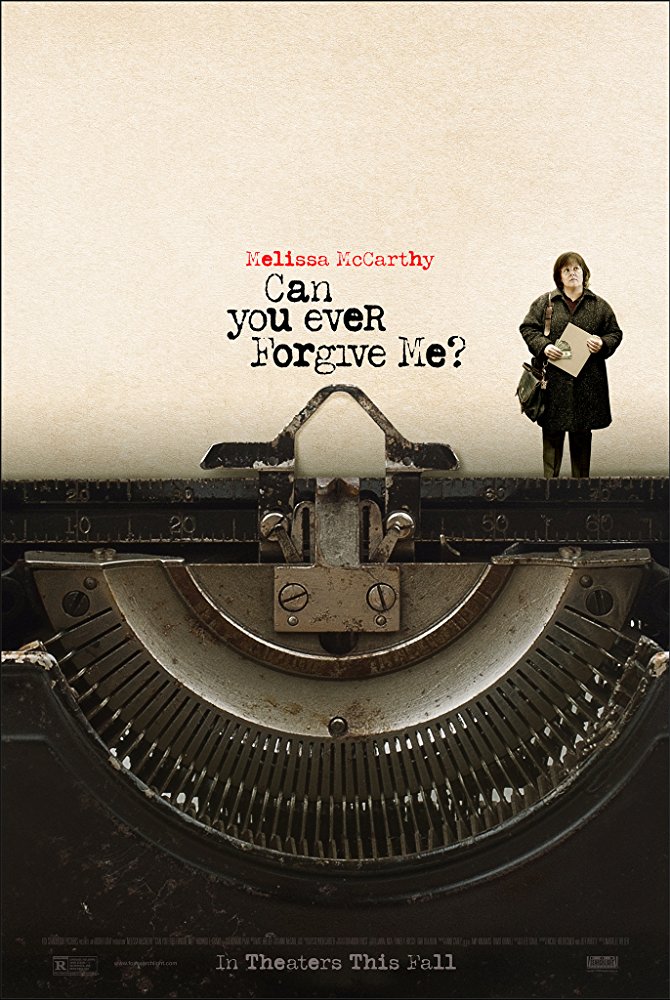
The once-acclaimed Lee, now desperate and dead-broke, turned her boundless energy and perverse imagination into a new enterprise, creating phony but ingeniously believable words and witticisms of legendary figures. A great American forger, she was able to make a living by selling counterfeit celebrity letters to collectors, plunging in the process into a life of crime, theft, delusion, and deception.
You could argue that the role’s the thing, that any gifted actress could have played it–but you would be wrong.
Melissa McCarthy, mostly known for her comedic talents, digs deep into the role of Israel, a part unlike any other in her repertoire. (Julianne Moore had been originally attached to this project, but she dropped out.
It’s a well-known saga in the inevitable vicissitudes that have always defined the Hollywood industry: A major actress, cast against type, proving her considerable talent and skills in a role that had not been intended for her.
Can You Ever Forgive Me? is not a great movie by any means, and the main reason to see it is McCarthy’s astonishing performance, as well as Richard Grant’s role as her only friend and collaborator.
With some luck and justice, McCarthy would earn her first Best Actress Oscar nomination for a part which, as written, is not entirely sympathetic. She had been nominated once before, as Best Supporting Actress, for her role in the 2011 popular comedy, Bridsemaids.
The story of Lee Israel’s rise and fall as a literary forger might seemed far-fetched if a screenwriter made it up, but it all really happened. Israel herself recounted it in the self-deprecating, humor-spiked 2008 memoir of her misadventures, Can You Ever Forgive Me?
Director Marielle Heller, who made a name with her striking feature debut, Diary of a Teenage Girl, along with her female collaborators–producers Anne Carey and Amy Nauiokas, screenwriter Nicole Holofcener, editor Anne McCabe–brings Israel’s moving story to the screen.
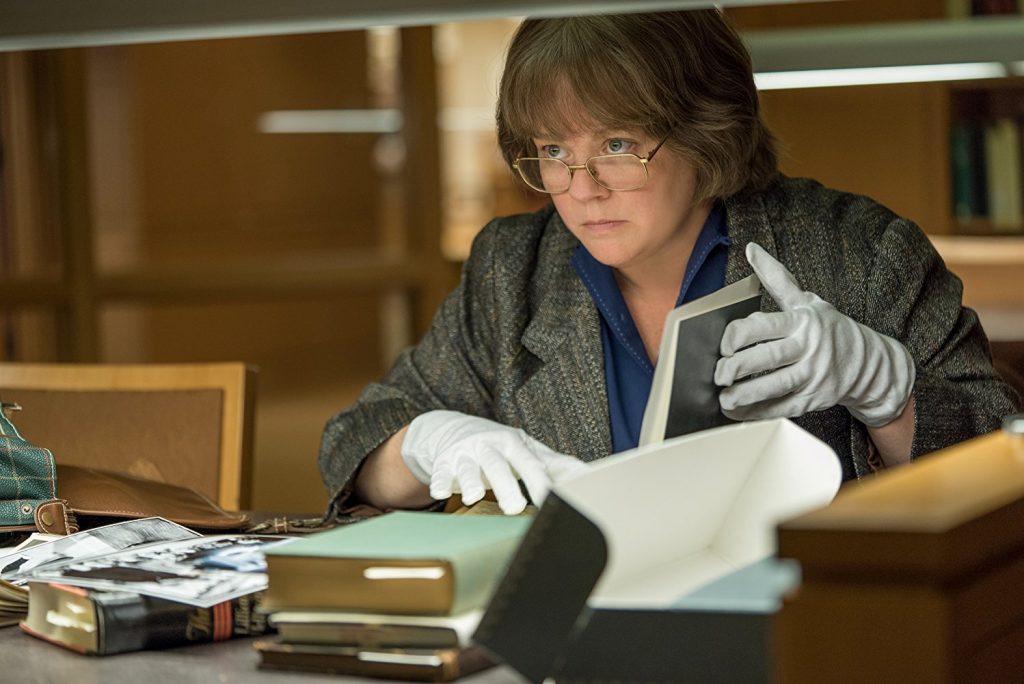
Complex Personality
McCarthy excels in bringing to life the complex, multi-faceted personality of the woman she plays, Lee Israel. What makes the part (and the whole movie) works is that, beneath Israel’s capers, there was a more personal and sad story, that of a lonely, cat-loving, hard-boozing outcast. Inspired with a reverence for the literary rascals she was imitating, Israel played the forgery game with style and panache. By finding success in the marketplace with her flawless forgeries, Israel finally gained validation for her own eccentric passions, including attention from the FBI. When her business grew too hot and too big for her to handle alone, she brought an accomplice into her scheme, the larcenous street hustler Jack Hock. Lee, ever the loner, was forced to learn how to share her life with another person.
Lee Israel is not a typical female protagonist: she’s an anti-hero who breaks the long-standing mold of gritty male anti-heroes. “I feel like movies have all these complicated, wonderful male characters who can be very rough-edged and morally ambiguous and we don’t ever question that,” Heller says. “To have a story featuring a woman who is complicated, who is a difficult person, who commits crimes, yet who is also feisty, smart, clever and ambitious, is exciting.”
McCarthy: I want people to love Lee as much as I do
McCarthy notes about portraying Israel: “I have become so attached to Lee that I just want people to see her for everything she was: for her talent, her intelligence, her caustic, remarkable wit and to also see her difficult circumstances, her flaws, her broken heart, her anger. I want people to love her as much as I do.”
Lee Israel never envisioned a life of poverty and crime. In the heady days of 1970s Manhattan, she was a celebrated biographer with big aspirations. Her two best-selling books (well-received biographies of screen star Tallulah Bankhead and showbiz reporter Dorothy Kilgallen) won her entry into New York’s literary scene.
But when her third book, a biography of Estee Lauder, tanked, in the blink of an eye, Israel’s life flipped upside down. In a new era of mega-bestsellers and “brand-name” authors, Israel was persona non-grata. Her agent wouldn’t take her calls, the fancy party invites dried up, and she couldn’t get a job. Soon, she found herself living in squalor, surrounded only by musty books from a bygone era and her beloved cat Jersey.
As she skidded to rock bottom, Israel couldn’t comprehend how a writer of her talents could have fallen so far. But then things got worse. Unable to pay for an emergency visit to the vet for her cat, Israel sold everything she owned of value, including a signed original letter from Kate Hepburn. The $200 she received for the sale of that letter, planted a see in Lee’s mind.
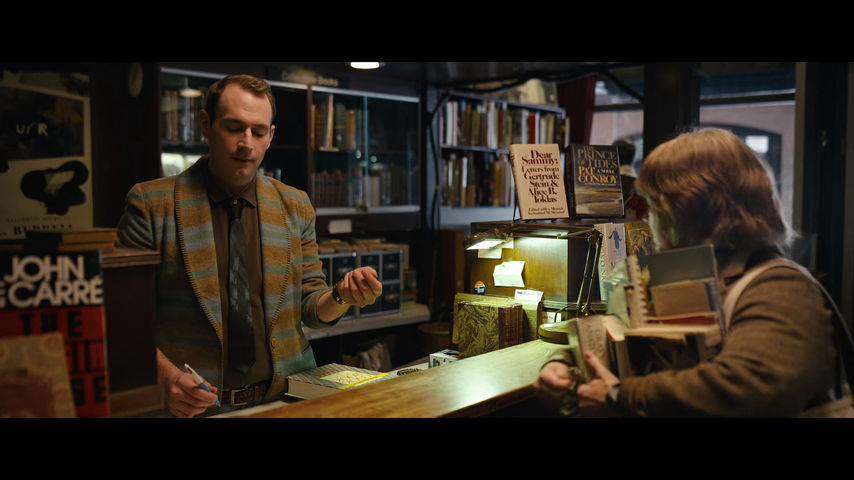
Fate as Determinant
Fate intervened while she was researching comic film and stage pioneer Fanny Brice for a new biography. After discovering and stealing two letters written by Brice from the Public Library, which she then sold to a collector, Israel came up with a sly idea. She created more letters to maintain the cash flow, thus beginning a new career in sophisticated literary forgery.
Israel created faux correspondence from such literary as Dorothy Parker, Ernest Hemingway, Noel Coward, Edna Ferber, Lillian Hellman, Louise Brooks, George S. Kaufman. She took her craft seriously, meticulously studying her subjects, to match their writing styles. Lee even collected vintage typewriters from all the relevant eras. Her forgeries were undetectable.
At times, she felt she was channeling the illustrious authors’ spirits, infusing her own life and soul with theirs. She convinced herself that she was doing no harm, merely shining light on celebrity legends renowned for the wit and sophistication. She reveled in their cleverness, creating letters highlighting the sparkling, quotable adages, which had made them immortal.
Meanwhile, life with a steady income grew more fun, filled with mischief, action and even admirers. But there was one major problem: Israel was committing felonies.
The tension between the fiercely intelligent, talented writer and her life of hoodwinking and crime is part of what drew the filmmakers to this unique story. Says producer Amy Nauiokas: “I found Lee to be fascinating in her boldness and her abrasiveness, especially at that time since professional women were not encouraged to have any of those particular traits. She had a truth to her that was unrelenting. I read the book in a tent in the middle of Tanzania by lantern and I just couldn’t put it down.”

Pleasures of Wit
Anne Carey says: “I originally fell in love with the book because it reminded me of women I met when I first moved to New York and was working in the book-to-movie world. I kept encountering these women who were super smart, all single, had cats, lived way beyond their means, and were kind of out-of-sorts with the rest of the world. I felt like I knew Lee, yet I’d never seen this kind of story on screen. I loved that it is also a story about the pleasures of wit, it’s a story about New York and it’s a story about a friendship between two people who supported one another in their own strange, mischievous ways.”
Producer David Yarnell, who was a friend and confidante to Lee Israel before her death in 2014, convinced her to write her memoir. They met when Yarnell optioned the movie rights to her first two books–and soon after, Israel reluctantly told him the story of her miscreant years.
“I was having lunch with her and she said, ‘you know, I did something in my life that I’m really not proud of. I don’t even want to talk about it,’” Yarnell recalls. “And I said, ‘Well, now you’ve got to talk about it.’ I gave her another scotch, which eased her into telling the story of both purloining and forging the letters of very famous people concentrating on members of the Algonquin Round Table [a group of leading literary lights who met at New York’s Algonquin Hotel for lunch each day in the 1920s]: Lillian Hellman, George S Kaufman, Louise Brooks and Dorothy Parker. It was an undertaking that was illegal and dangerous but it had also given her a deep sort of satisfaction–she was thrilled by being able to pass off her own writing as theirs.”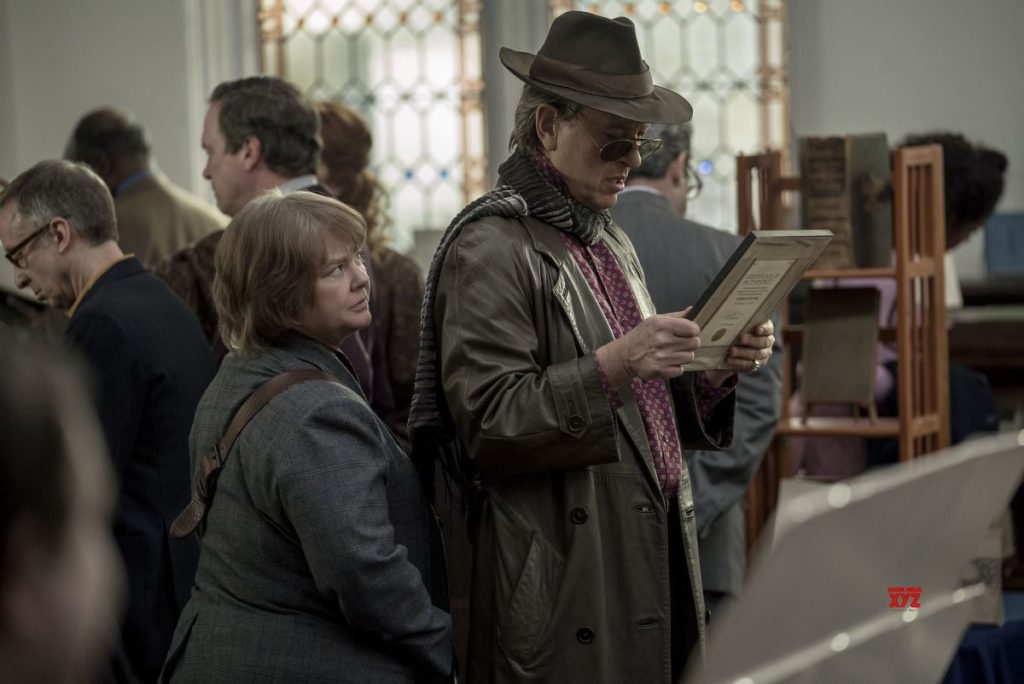
Yarnell encouraged Israel to write the story of the sordid episode, including the surreal notion of being a bookish recluse playing catch-me-if-you-can with the FBI, in her own candid, sharp-tongued voice. Ironically, when she finally wrote her story she gained the literary attention for which she had so long hungered. Yarnell also knew the story had an inherently cinematic quality, even if Israel upended any typical notion of an outlaw and con artist. Prior to Israel’s death, the two of them met with producer Carey.
“We always wanted to see Lee’s story become a film,” Yarnell says. “But it was Anne Carey who really brought this dream to fruition. When we met with Anne, Lee told her, ‘If you’re going to make a film, David has got to be part of this.’”
Carey enlisted acclaimed screenwriters known for their keen sense of offbeat humor to adapt Israel’s memoir: Tony Award-winning book writer Jeff Whitty (“Avenue Q”) and filmmaker Nicole Holofcener (“Friends with Money”), who each turned in drafts to fully realize the larger–than-life qualities of Israel while remaining grounded in the unfortunate circumstances surrounding her misadventures.
Whitty, whose stage work includes “The Further Adventures of Hedda Gabler,” has dedicated much of his career to such iconic female roles. Holofcener, known for writing and directing emotional films featuring unapologetically complex women, adapted the memoir with fast-paced drama, laced with suspense and humanity. “The script totally captured Lee’s fighting spirit,” says Yarnell.
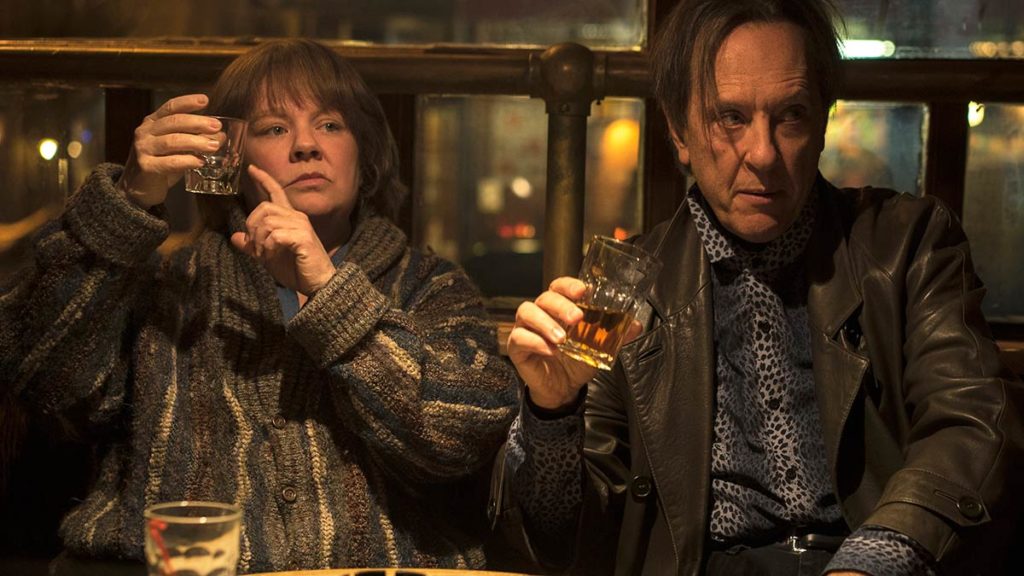
Both Whitty and Holofcener had met Israel before her death. “I knew she was very sick at the time, and wish so much she could have seen the finished film. I went into her apartment and it was smaller than I imagined and had a sad view of another building. She had a million wonderful books and many cat motifs on mugs and pictures,” says Holofcener.
When Israel passed away from complications of myeloma in 2014, Yarnell remained at her side, even finding a home for her two cats. He feels she would be pleased to see her story come to life in the way it has, celebrating not only her knack for wisecracks, but also her spirit of survival and defiance of a world in which she was nearly invisible. “Lee was feisty, witty, acerbic and tough. When she lost her dignity and had to eke out a living, she fought back. We all have those moments in life when we feel rejected or that our efforts are fruitless. We all can identify with someone who was on a downward cycle, who looked like she was absolutely defeated, but instead carved out her own way to have a taste of success.”
Nauiokas and Carey entrusted that script with rising director Marielle Heller. Impressed with her early work, the Archer Gray team helped nurture Heller’s career, encouraging her to attend the Sundance Writer’s and Director’s Labs, and producing her debut feature, Diary of a Teenage Girl, based on the graphic novel by Phoebe Gloeckner. Both felt Heller was a distinctive match with the material.
“Marielle is relentless and it shows in everything she does,” says Nauiokas. “She has a personal vision and a talent for moving people that really bonded everyone on this project together. Her directorial style is very understated, but at the same time she brings a big presence because she’s got so much depth and passion. I find her to be incredibly brave and honest, which this movie absolutely needed. Because she so respects and appreciates women and really understands what it means to be a woman in a certain time and space on this journey, she brings something very, very authentic to it.”
Adds Carey: “When we first met Marielle she had a certain quality that I think all first-time directors need to have: she just radiated ‘I’m going to make my movie, no matter what it takes.’ You have to have that, and she had it. Now with her second movie, it’s been wonderful to see her confidence growing even stronger but also to see her becoming more grounded. “
Heller recalls: “As soon as I read it I was enthralled, I just felt so connected to Lee. I’m very much a cat person so that was something that grabbed me really quickly and also, I love old bookstores, I love that whole New York literary world Lee lived within. But I also just got really excited about a female character who can sometimes be a bit of an asshole. She’s unapologetically who she is, a funny, tough broad.”
Rarely is a woman protagonist the gruff, law-skirting antihero in cinema. “I want to be able to tell stories about women who society would otherwise ignore and not look at closely,” Heller states. “Lee is somebody who was certainly very flawed, but also really resourceful and ingenious. Whether or not you agree with what she did—because there’s no doubt what she did was criminal—she used her brains and her gifts to achieve something when all looked lost. She figured out a way to survive and to keep going, and most of all, she had some real fun while doing it.”



